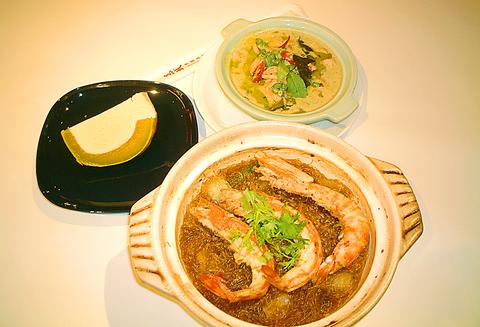One of Taipei's long-serving Thai restaurant chains, Thai Town Cuisine -- which until earlier this year went by the name Very Thai -- has been cooking up some of the tastiest and spiciest Siamese meals in the city for over six years.
Unlike the bad luck that is likely to ensure following the changing of a ship's name, the name-change and interior face-lift that saw the chain's Nanjing East Road store reopening under its new moniker earlier this year, have neither dented its reputation nor seen the restaurant flounder in anyway.

PHOTO: GAVIN PHIPPS, TAIPEI TIMES
In fact, since reopening for business in April, Thai Town Cuisine, with its new slick black-and-red interior, has experienced quite the opposite after-effect. Patronage has continued to increase and looks set to continue to do so for the unforeseeable future.
The secret of its success, according to marketing supervisor Jean Lin (林宜靜), lays not only with the quality of the food served at Thai Town Cuisine, but is also heavily influenced by management's tenacity for consistency. Whether you choose to chow down at the chain's Tienmou branch or its Yongho branch, the food that will arrive at your table will be equally scrumptious, regardless of the social environment of the neighborhood you opt to dine in. "It's often difficult when you run a chain store to maintain a constant level of quality," explained Lin. "With one restaurant, it's easy to keep a good reputation, but, more often than not, when restaurants expand it all goes downhill." To ensure Thai Town Cuisine doesn't join the long list of establishments that have branched out, but failed to keep them coming back for more, management keeps an eye on its kitchens and what takes place within them. Much of what appears on the menu certainly won't come as a surprise to lovers of traditional Siamese fare. The uniform quality of the product, however, is worth noting. The menu is packed with all the standard Thai dishes such as curry crab (NT$450), sweet and sour cod Thai-style (NT$300), king pawn vermicelli (NT$450), spicy beef and cashew nuts (NT280) and coconut beef curry (NT$280) to name but a few. Along with the usual suspects, Thai Town does throw a few original dishes in the diner's direction. Finding dishes such as the red curry with vegetables and fruit (NT$180), deep-fried sea bass with tamarind and chili (NT$450), spicy octopus with cashew nuts (NT$300) and roasted pork with lemon sauce (NT$280) on the menu makes for a pleasant and certainly tasty change. The thing that really sets Thai Town Cuisine apart from its many peers, however, is the manner in which the chefs ensure each dish fires a chili-loaded salvo. Whatever you choose to dine on, it's guaranteed that it will contain a whole heap of chili and garlic. As well as Thai Town Cuisine's Yongho, Nanjing East Road and Tienmou branches, fans of Thai food who call Panchiao and Sanchung home can also experience the chain's appetizing Thai food.

Most heroes are remembered for the battles they fought. Taiwan’s Black Bat Squadron is remembered for flying into Chinese airspace 838 times between 1953 and 1967, and for the 148 men whose sacrifice bought the intelligence that kept Taiwan secure. Two-thirds of the squadron died carrying out missions most people wouldn’t learn about for another 40 years. The squadron lost 15 aircraft and 148 crew members over those 14 years, making it the deadliest unit in Taiwan’s military history by casualty rate. They flew at night, often at low altitudes, straight into some of the most heavily defended airspace in Asia.

Beijing’s ironic, abusive tantrums aimed at Japan since Japanese Prime Minister Sanae Takaichi publicly stated that a Taiwan contingency would be an existential crisis for Japan, have revealed for all the world to see that the People’s Republic of China (PRC) lusts after Okinawa. We all owe Takaichi a debt of thanks for getting the PRC to make that public. The PRC and its netizens, taking their cue from the Chinese Communist Party (CCP), are presenting Okinawa by mirroring the claims about Taiwan. Official PRC propaganda organs began to wax lyrical about Okinawa’s “unsettled status” beginning last month. A Global

Taiwan’s democracy is at risk. Be very alarmed. This is not a drill. The current constitutional crisis progressed slowly, then suddenly. Political tensions, partisan hostility and emotions are all running high right when cool heads and calm negotiation are most needed. Oxford defines brinkmanship as: “The art or practice of pursuing a dangerous policy to the limits of safety before stopping, especially in politics.” It says the term comes from a quote from a 1956 Cold War interview with then-American Secretary of State John Foster Dulles, when he said: ‘The ability to get to the verge without getting into the war is

Like much in the world today, theater has experienced major disruptions over the six years since COVID-19. The pandemic, the war in Ukraine and social media have created a new normal of geopolitical and information uncertainty, and the performing arts are not immune to these effects. “Ten years ago people wanted to come to the theater to engage with important issues, but now the Internet allows them to engage with those issues powerfully and immediately,” said Faith Tan, programming director of the Esplanade in Singapore, speaking last week in Japan. “One reaction to unpredictability has been a renewed emphasis on